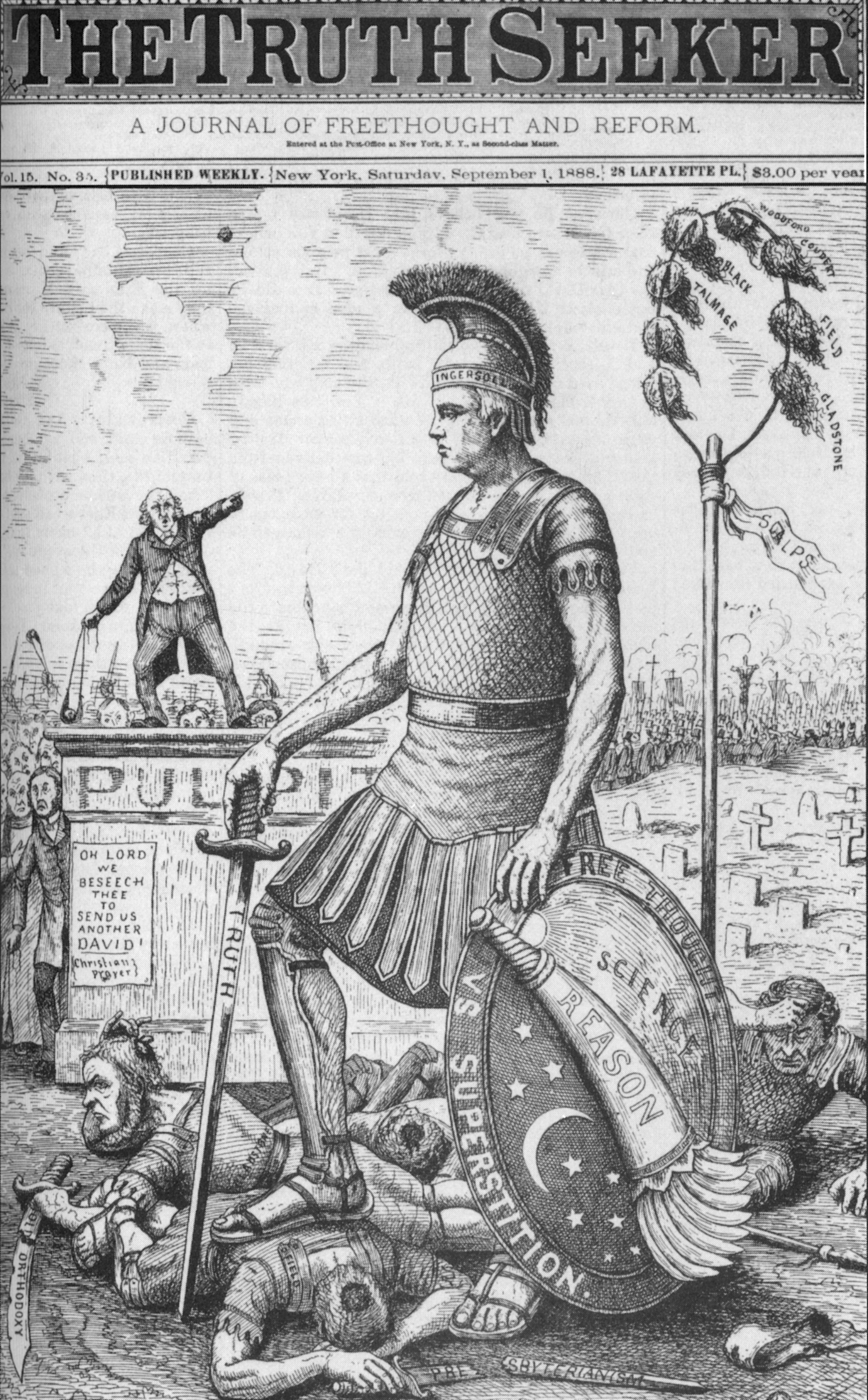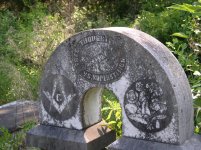Jobar
Zen Hedonist
I recently came across a long list of quotes from the works of Col. Robert Green Ingersoll, August 11, 1833 – July 21, 1899. He was "an American lawyer, a Civil War veteran, politician, and orator of the United States during the Golden Age of Free Thought, noted for his broad range of culture and his defense of agnosticism. He was nicknamed "The Great Agnostic"."
It saddens and troubles me that I never heard mention of this man in any American history course in grade school, high school, or college; indeed, I had gray hairs before I ever learned anything about him. His legacy is such that no US student should be left unfamiliar with his life and works.
I suspect that the man himself would reject the title 'saint', given the role call of rogues, fools, and monsters which the Catholic Church has given that name. But in the sense of "a person of great charity, patience, purity, meekness, and wisdom", I submit that he deserves it far more than do most churchly ones. Likewise he would probably not much care for being called 'atheist'- he referred to himself as an agnostic, and even a pantheist. But his own words make plain that he lacked belief in any god- and thus IMO it's fair to call him atheist.
He was a committed Republican for all his adult life; I have no doubt that he would be disgusted and infuriated to see what has become of the party of Lincoln in our own day and age. It's said he would very likely have been elected President of the US, if he had not written so many books, and made so many speeches, revealing and condemning the dark face of Christian belief.
It's also said that the man had an incredible speaking voice, made much of his living as an orator addressing huge crowds, and was actually heard by more people than any single man ever was, before the advent of radio.
Some of his words-
Really, I could read his works all day, and sometimes have; I own a CD with his collected works, with more than ten thousand pages of his writings, and many photographs. One of the best buys I ever made. That list of quotes is well worth reading in its entirety, also.
It saddens and troubles me that I never heard mention of this man in any American history course in grade school, high school, or college; indeed, I had gray hairs before I ever learned anything about him. His legacy is such that no US student should be left unfamiliar with his life and works.
I suspect that the man himself would reject the title 'saint', given the role call of rogues, fools, and monsters which the Catholic Church has given that name. But in the sense of "a person of great charity, patience, purity, meekness, and wisdom", I submit that he deserves it far more than do most churchly ones. Likewise he would probably not much care for being called 'atheist'- he referred to himself as an agnostic, and even a pantheist. But his own words make plain that he lacked belief in any god- and thus IMO it's fair to call him atheist.
He was a committed Republican for all his adult life; I have no doubt that he would be disgusted and infuriated to see what has become of the party of Lincoln in our own day and age. It's said he would very likely have been elected President of the US, if he had not written so many books, and made so many speeches, revealing and condemning the dark face of Christian belief.
It's also said that the man had an incredible speaking voice, made much of his living as an orator addressing huge crowds, and was actually heard by more people than any single man ever was, before the advent of radio.
Some of his words-
Justice is the only worship.
Love is the only priest.
Ignorance is the only slavery.
Happiness is the only good.
The time to be happy is now,
The place to be happy is here,
The way to be happy is to make others so.
Wisdom is the science of happiness.
------------
I will not attack your doctrines nor your creeds if they accord liberty to me. If they hold thought to be dangerous - if they aver that doubt is a crime, then I attack them one and all, because they enslave the minds of men.
I attack the monsters, the phantoms of imagination that have ruled the world. I attack slavery. I ask for room -- room for the human mind.
-----------
The hands that help are better far than lips that pray.
-----------
Why should we place Christ at the top and summit of the human race? Was he kinder, more forgiving, more self-sacrificing than Buddha? Was he wiser, did he meet death with more perfect calmness, than Socrates? Was he more patient, more charitable, than Epictetus? Was he a greater philosopher, a deeper thinker, than Epicurus? In what respect was he the superior of Zoroaster? Was he gentler than Lao-tsze, more universal than Confucius? Were his ideas of human rights and duties superior to those of Zeno? Did he express grander truths than Cicero? Was his mind subtler than Spinoza’s? Was his brain equal to Kepler’s or Newton’s? Was he grander in death – a sublimer martyr than Bruno? Was he in intelligence, in the force and beauty of expression, in breadth and scope of thought, in wealth of illustration, in aptness of comparison, in knowledge of the human brain and heart, of all passions, hopes and fears, the equal of Shakespeare, the greatest of the human race?
----------
It has always seemed absurd to suppose that a god would choose for his companions, during all eternity, the dear souls whose highest and only ambition is to obey.
----------
There are treasures in books that all the money in the world cannot buy, but the poorest laborer can have for nothing.
----------
If abuses are destroyed, man must destroy them. If slaves are freed, man must free them. If new truths are discovered, man must discover them. If the naked are clothed; if the hungry are fed; if justice is done; if labor is rewarded; if superstition is driven from the mind; if the defenseless are protected and if the right finally triumphs, all must be the work of man. The grand victories of the future must be won by man, and by man alone.
----------
We read the pagan sacred books with profit and delight. With myth and fable we are ever charmed, and find a pleasure in the endless repetition of the beautiful, poetic, and absurd. We find, in all these records of the past, philosophies and dreams, and efforts stained with tears, of great and tender souls who tried to pierce the mystery of life and death, to answer the eternal questions of the Whence and Whither, and vainly sought to make, with bits of shattered glass, a mirror that would, in very truth, reflect the face and form of Nature's perfect self.
These myths were born of hopes, and fears, and tears, and smiles, and they were touched and colored by all there is of joy and grief between the rosy dawn of birth, and death's sad night. They clothed even the stars with passion, and gave to gods the faults and frailties of the sons of men. In them, the winds and waves were music, and all the lakes, and streams, and springs,—the mountains, woods and perfumed dells were haunted by a thousand fairy forms. They thrilled the veins of Spring with tremulous desire; made tawny Summer's billowed breast the throne and home of love; filled Autumns arms with sun-kissed grapes, and gathered sheaves; and pictured Winter as a weak old king who felt, like Lear upon his withered face, Cordelia's tears. These myths, though false, are beautiful, and have for many ages and in countless ways, enriched the heart and kindled thought. But if the world were taught that all these things are true and all inspired of God, and that eternal punishment will be the lot of him who dares deny or doubt, the sweetest myth of all the Fable World would lose its beauty, and become a scorned and hateful thing to every brave and thoughtful man.
Really, I could read his works all day, and sometimes have; I own a CD with his collected works, with more than ten thousand pages of his writings, and many photographs. One of the best buys I ever made. That list of quotes is well worth reading in its entirety, also.


